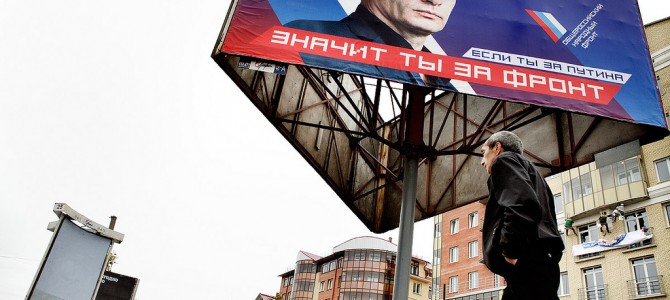
I’ll let the experts churn out opinions on what should be done about Russia’s invasion of Ukraine (or is it the former Ukraine, yet?). But it does appear that many of them refuse to accept a number of truths about the world. For instance: 1- Most people do not shares our values. 2 – Most people don’t even understand our values. 3- Authoritarianism is often more popular than freedom. 4 – Democracy and liberalism are not the same. (I argue this point – not coincidentally! — in detail in my new book, The People Have Spoken (And They Are Wrong): The Case against Democracy.)
Putin may face international disapproval from the West over his Crimean actions, and he may even have to deal with some short-term ineffectual sanctions; but at home, he’s enjoying his highest approval ratings in years. Yet, we act as if Putin is acting alone. Before the invasion, the respected Levada Center found that 65 percent of respondents approved of Putin’s leadership. According to the Guardian, the less respected pollsters at VTsIOM, gauged Russian attitudes on 1-2 March and found that nearly 68 percent of respondents approved of Putin’s job performance. That was right as Russian troops were entering Crimea, so expect that number to go up.
Putin has enjoyed 60 percent approval rating throughout his career, and often much higher. Despite a stagnating economy, a Pew Poll in 2012 found that 72 percent thought Putin was doing a good job. It’s the kind of support that — apart from some fleeting moments of history – is, thankfully, unachievable in a healthy democratic nation. Despite some of the political rhetoric we hear at home, too much unity reflects poorly on a nation’s health.
And the more Putin undermines liberal institutions the more popular he becomes. The people who vote for the presidents of Russia and the United States view are unrelated, emerging from distinct historical, moral and ideological perspectives. So expecting people — even people given a vote — to act in what we consider a logical manner, is a waste of time. While we, for example, may be confused about the harsh fate of Pussy Riot!, only 5 percent of Russians believed that the punk/activist band didn’t deserve serious penalties for its actions. Actually, 29 percent believed that the band should have been sent into forced labor, while 37 percent believe they should be imprisoned.
So the Russian government controls the country’s three main television channels, and at the end of 2013, Putin replaced the national news agency with a new and more compliant version. This undermines the free press, of course, but the ugly fact is there doesn’t seem to be much anger about it. In recent years, the Kremlin has imposed limits on protests, criminalized libel, and censored political material on the internet. It has banned the work of nongovernmental organizations (typically aimed at fostering more transparency in government), frozen the assets of human rights groups that receive funding from U.S. citizens, and jailed the political opposition. Occasionally a dissident dies of poisoning.
But the reversal of once promising liberal reforms in Russia is not the result of an undermining of democracy. It happened with the full consent of the electorate. In Russia’s first presidential election, in 2000, Vladimir Putin, who had previously been made prime minister, won 53 percent of the vote. In 2004, he won 71 percent of the vote. In 2008, his lackey Dmitry Medvedev also won in a landslide. In 2012, Putin returned to the presidency in a landslide election with a parliament dominated by members of his party, giving him virtually one party rule.
Sadder still, Putin may be a better choice. It’s not like there democrats with widespread support are waiting in the wings. Remember, it was the Communist Party leader, Gennady Zyuganov, who came in second place last election with 20 percent of the vote. In a 2009 poll. nearly 60 percent of Russians said they ‘deeply regret’ the Soviet Union’s demise.
Forget the Middle East, where we’ve thankfully stopped pretending democracy is a panacea, and take a closer look at Russia’s neighborhood. In nearby Uzbekistan, Islam Karimov, the country’s only president since independence in 1991 and whose rule has seen widespread torture, murder, corruption, press censorship, and roundups of political dissidents, won his last election with 88 percent,10 down from his previous high of 91 percent. In Kazakhstan, Nursultan Nazarbayev has also been in control since 1991, winning 96 percent of the vote in 2011. Democracy isn’t exactly a competitive enterprise there, as three of Nazarbayev’s opponents endorsed him.
In Politico, Gregory Feifer recently wrote:
But the real glue holding the population to Putin’s regime isn’t rising expectations but the country’s all-encompassing corruption, starting with the daily bribes Russians must pay to traffic police, building inspectors and most other officials with discretionary power.
Obviously, there are barriers to a healthy vote in Russia. And maybe people lie to pollsters. Or maybe most people don’t understand or care very much about liberalism. According to a 2011 Pew Research study of global attitudes about democracy, over 60 percent of Ukrainians and Russians told researchers that they would rather have a strong leader than a democratic government.
Well, they have it now.
David Harsanyi is a Senior Editor at The Federalist and author of the forthcoming The People Have Spoken (and They Are Wrong): The Case Against Democracy. Follow him on Twitter.









